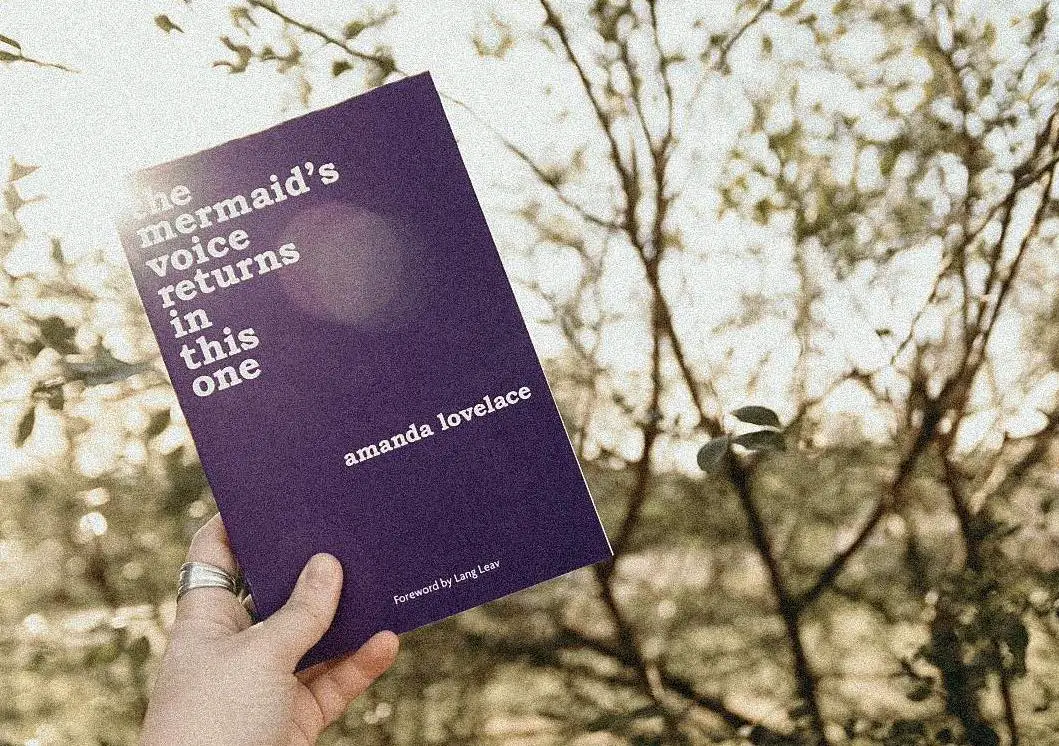So far, we’ve met the inspiring Princess and raised our voices alongside the fiery Witch. Now, it’s time to listen to the Mermaid’s song. Amanda Lovelace’s highly praised “Women Are Some Kind of Magic” poetry collection has concluded three years after its first installment was published. On March 5, the third and final book in the series, titled “the mermaid’s voice returns in this one,” hit bookstores, much to the excitement of Lovelace’s followers.
The book follows in its predecessors’ footsteps, as it celebrates the strength and beauty of women, as they’re constantly subject to discrimination based on sex. It’s important to note that “the mermaid’s voice returns in this one” confronts sexual abuse, abusive relationships, child abuse and other triggering experiences. As always, Lovelace provides a trigger warning at the very beginning of her collection.
If you’re not already familiar with Lovelace, the poetess hails from New Jersey and is widely recognized for her empowering feminist prose. Her first collection, “the princess saves herself in this one,” won the 2016 Goodreads Choice Awards in the poetry category. Her second book, “the witch doesn’t burn in this one,” also won the award in 2018.
One aspect that’s made “the princess saves herself in this one” and “the witch doesn’t burn in this one” successful is Lovelace’s ability to write raw, emotional passages that connect to readers through Instapoetry.
There’s a zest to this mode of writing, which comes from a reader’s ability to quickly connect with the emotions that underlie what critics might consider simple or underwhelming attempts at traditional methods of self-expression.
Love it or hate it, Instapoetry is what many millennial readers are turning to when trying out the genre for the first time, as it’s easily accessible on social media.
Unfortunately, it’s a bit ironic that it this structure, which served Lovelace’s previous books so well, that makes “the mermaid’s voice returns in this one” fall a bit flat collectively, and as an ending to such a momentous series.
What Happened to the Mermaid’s Song?
The Princess inspires you to break your silence, the Witch tells you that it’s okay to raise your voice and the Mermaid’s song … feels a bit lost.
Unfortunately, I can’t tell whether or not the Mermaid reclaims herself, which makes this particular collection feel like a first step into the themes it explores rather than an unapologetic finale.
In an interview with Bustle, Lovelace comments on the hyper-sexualization that mermaids are subject to, and how this portrayal of mythical creatures feeds into rape culture. “Even the symbol for a popular coffee company is a twin-tailed mermaid,” she says. “Another way of looking at it is that her tail has been split in half. But why? In search for what?”
Though the concept of mermaids is there to aid the storytelling aspect of the collection, there aren’t many poems that actually utilize the mythology of the underwater creatures to send a message. Some imagery is scattered here and there, but it feels too random to mesh together across the pages.
The four sections that “the mermaid saves herself in this one” is divided into explore the progression of the Mermaid’s journey as she confronts sexual trauma and her process of healing.
A hesitancy that has not been obviously present in Lovelace’s writing is suddenly apparent. I kept searching for a grand celebration of women that I found so abundantly in “the witch doesn’t burn in this one”” or a reclaiming of the Mermaid’s stereotypical seductive nature that she’s so ashamed of.
Where’s the moment in which the Mermaid unapologetically loves her body, and love itself? Where is that final bang, that explosive conclusion that defined her previous collections?
The mermaid’s image, such as her tail, is used to describe the ways she’s been broken rather than how it empowers her.
Of course, readers can expect to be introduced to the trauma and then the process of healing. But, in this collection, it takes a long time for the Mermaid to want to heal, and when she does, it feels a bit glazed over with poems that feel like they’re just filling a page. Lovelace tells the reader “to take [her] words, / but expand upon them. / argue with them. /change them. /twist them,” and closes off too quickly.
After “the witch doesn’t burn in this one,” which grounds its poems in the right of survivors to be angry about the trauma they’ve endured, it feels as if “the mermaid’s voice returns in this one” is a wobbly step backward.
Sexual abuse survivors, of course, all have a different experience and no one processes what’s happened or heals in the same way. This doesn’t invalidate Lovelace’s own mental-health struggles, or those who identify with her work.
The End of an Era
Although “the mermaid’s voice returns in this one” is missing a few key elements typically found in a Lovelace collection, there are stunning contributions by other poets, such as Nikita Gill, in the book’s final section.
There are a few of Lovelace’s own poems that, though they come near the end, do feel redeeming. “Tweet from august 8th, 2017,” is especially encouraging to read after a long journey of abuse: “you did all you could do / now you must learn / what it means / for you to / live.”
Poems like this would have been more effective earlier in the collection. Instead of multiple sections of destruction and only one of healing, I think there would have been a greater impact if the Mermaid’s voice returned earlier in the collection and readers could experience the many ways in which she thrives and continues to be a worthy, beautiful individual despite what she’s endured. How she overcame this proves that she’s powerful and strong.
Ultimately, though the series as a whole is moving and empowering, this much-anticipated poetry collection falls a bit flat in comparison to the previous two. There were too many times I thought to myself: “Have I already read this piece?” that took away from an otherwise magical series.
















